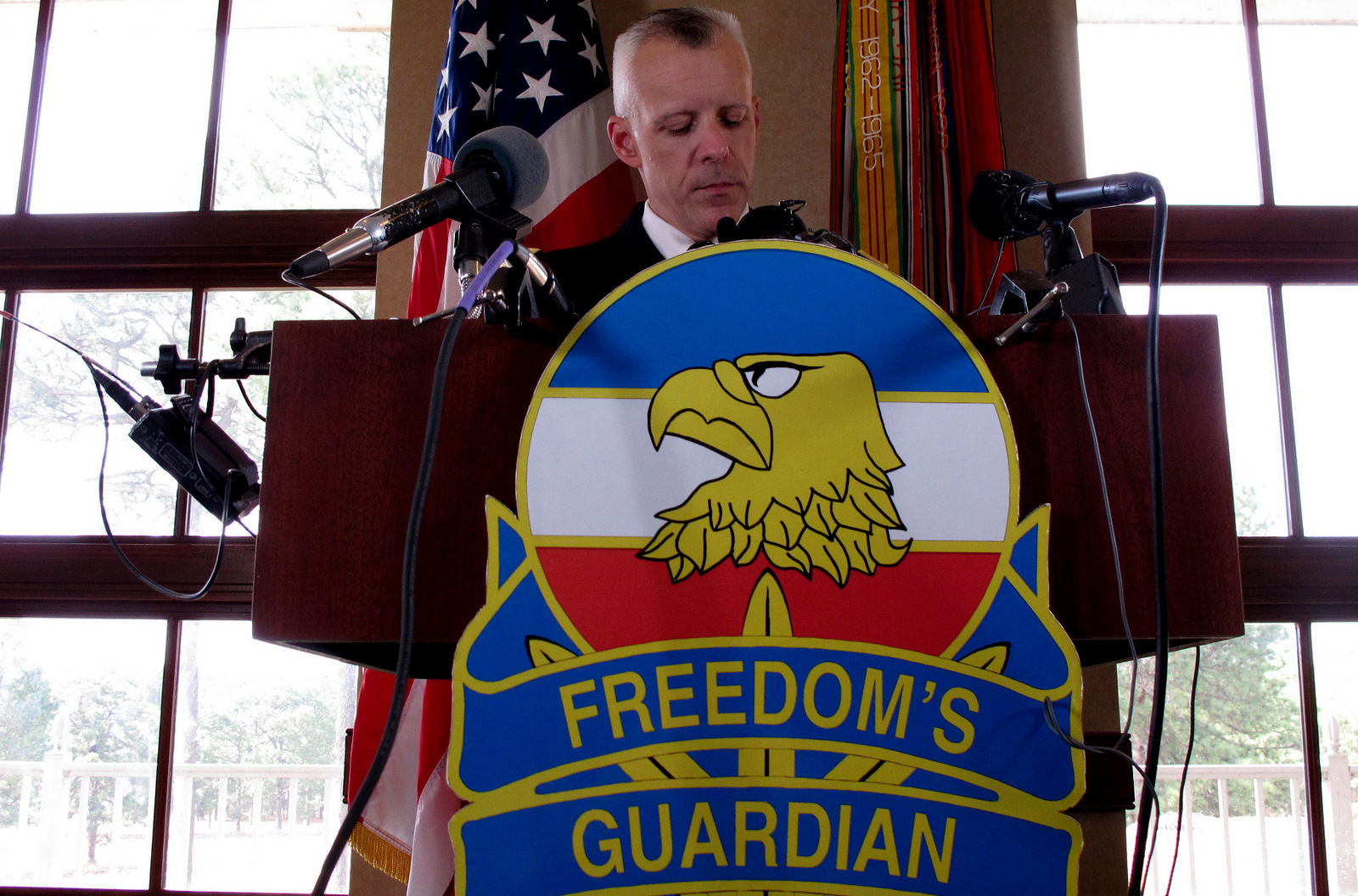
KITCHENER, Ontario — (ANALYSIS) In 2009, Bowe Bergdahl, an idealistic but disillusioned U.S. Army sergeant, left his post in Afghanistan and, without any weaponry, walked into the night where he was quickly captured by the Taliban. Thus began nearly five years of captivity that ended in May 2014, when President Barack Obama agreed to exchange five Taliban commanders held at Guantánamo, the U.S. torture center in Cuba, for Bergdahl.
Since his release, Mr. Bergdahl has been vilified by the right wing. The Republican House Intelligence Committee chairman, Michigan Rep. Mike Rogers, told MSNBC in June 2014: “He was not a prisoner of war; he was with the Haqqani network, which is a terrorist organization.” Also that month, Rep. Duncan Hunter of California told Fox News: “As John Kerry threw his medals over the White House fence and turned his back on all of his Vietnam brothers and sisters, that’s what Bergdahl did. Bergdahl walked away from his men and he left them in a bad spot.”
Other Republicans, who had demanded that Mr. Obama work harder to release the captive soldier, changed their tune significantly once that actually came to pass.
In December 2013, former Rep. Allen West of Florida said:
“Then there is Army SGT Bowe Bergdahl still held by the Islamic terrorist Haqqani network, probably in Pakistan. … Defense Secretary Chuck Hagel reiterated a pledge to secure the young Army NCO being held captive, but have there been any actions? Any time, attention, or even mention from the Commander-in-Chief? Nah, no camera highlights in it for him.”
Six months later, however:
“Ladies and gentlemen, I submit that Barack Hussein Obama’s unilateral negotiations with terrorists and the ensuing release of their key leadership without consult — mandated by law — with the U.S. Congress represents high crimes and misdemeanors, an impeachable offense.”
This vilification continues even today, as Bergdahl has been a talking point in the GOP race. Donald Trump, the Republican presidential candidate wannabe and billionaire blowhard, said in October: “We’re tired of Sgt. Bergdahl, who’s a traitor, a no-good traitor, who should have been executed.”

Despite five years of what is euphemistically referred to as “harsh treatment” by the Taliban, the U.S. military apparently feels that Mr. Bergdahl has not suffered enough. He is facing court-martial, with a possible penalty of life in prison. The U.S. government is always anxious to court-martial high-profile deserters, but with Mr. Bergdahl, it appears that there is an extreme interest in seeing him punished.
Extraordinary measures to keep Bergdahl’s desertion under wraps
First, let us look at the extraordinary measures the military took to keep any information surrounding Mr. Bergdahl’s disappearance secret. Within days of his departure from his unit in Afghanistan, as Newsweek reported last month, the remaining men in the unit were ordered to sign papers swearing that they would never discuss his leaving or their efforts to locate him. Some, about to depart for home but who were hesitant to sign, were told they would not go home until they did so.

One must ask why this is so. Certainly, soldiers desert at a higher rate than the government would like publicly known. The rate of desertion peaked during the war in Vietnam, but any desertion belies the image the military wants to portray of patriotic young men and women willing to sacrifice their all for freedom and democracy.
Next, we must look at the situation in Afghanistan as it existed in 2009. The war was supposed to be in a phase of ”winning hearts and minds” and “supporting the Afghan people.” There were fewer soldiers deployed to this effort than to the one usually associated with war, which is killing people. So how, one might ask, could platoons in Afghanistan get more people to do that which war is really all about? Again, as reported by Newsweek last month, missions for personnel recovery were given more forces than others. So, despite the fact that it was quickly known that Mr. Bergdahl had been captured by the Taliban and removed, probably to Pakistan, that information could not become public. If it were, extra soldiers would not be assigned.
Based on this, one would think that Mr. Bergdahl, rather than being persecuted by the military, would at least be allowed to slip into obscurity. After all, his actions were used to provide more manpower for the U.S. military machine to flex its deadly muscle in Afghanistan.
The military is quite selective in how it portrays the actions of soldiers. When former NFL player Pat Tillman was killed in Iraq, the military reported that the Army Ranger died leading a courageous counterattack in a remote Afghan area. The truth was much less glamorous: Mr. Tillman died from what is euphemistically called “friendly fire”; he was accidentally shot and killed by a fellow U.S. soldier. The government, while offering effusive praise of him (then-President George W. Bush hailed him as a hero), didn’t mention his growing disillusionment with the Iraq War. As a former football player, he had some degree of celebrity, and since he didn’t live long enough to publicly criticize the war, he could be held up as a paragon of that uniquely American brand of patriotism. If only Mr. Bergdahl had been fortunate enough to have died in captivity! One can only imagine the stories of courage and heroism that would have been invented about him!

But no, he had the temerity to survive five years of captivity after leaving his post, so he must now be painted with the multiple ugly brushes of “deserter,” “traitor” and “coward.” The truth of his capture and imprisonment must remain obscured, leaving it open to all kinds of speculation. Speaking to Bill O’Reilly on Fox News in 2009, Lt. Col. Tony Shaffer declared that a Naval Criminal Investigative Agency (NCIS) report revealed that there was “clear evidence that he was ‘going over to the other side.’” Unfortunately, no such report ever existed. The truth, however, is even uglier than the lie, at least from the point of view of the U.S. military: Last December, Mr. Bergdahl said he wanted to expose what he saw as “leadership failure” in the military.
Perhaps now we are beginning to answer the question of why the U.S. seems to want to portray Mr. Bergdahl as evil incarnate. If any of the lies surrounding his desertion (if desertion it was), capture, imprisonment and release can be believed, no one need look too closely at leadership failure in the longest running war in U.S. history. No, much better to spread the lie that eight other soldiers died trying to find him. Don’t bother publicizing the fact that he gave no vital information to his captors. And while Arizona Sen. John McCain’s five-year imprisonment, resulting from his deadly assault on defenseless farmers in Vietnam, is seen as a badge of honor, better to ignore Mr. Bergdahl’s five-year imprisonment, resulting from his peaceful departure from his post.
More deserters than the US would like to admit
What can we make of this convoluted trail of lies, half-truths and innuendos? Why is Mr. Bergdahl, a man who left his post and endured five years of torture, now to be tried and probably convicted, at least in the U.S. press, if not by the government as well?
There appear to be a number of lessons to be learned from all this. First, if a soldier is going to desert, he or she should do it quietly. According to the military’s own figures, at least 59,000 soldiers have deserted in the last 13 years. Camilo Mejia, Stephen Funk and Kevin Benderman illegally left the military, and spoke publicly about their reasons for doing so. All three were tried and convicted of various offenses. But what about the others, the remaining 58,997? Few people would be able to name more than one or two, and these were people who either spoke publicly against either the Iraq or Afghanistan war or both.

Secondly, public relations, not duty or honor, has everything to do with how soldiers are viewed. Mr. McCain is considered a hero, mainly because of his years of captivity. His ability as a pilot during the Vietnam War to kill innocent farmers without ever seeing the horrific results of his actions, is never mentioned. Mr. Bergdahl, who left his assigned post to highlight leadership failures, and endured a basically equal time and degree of torture, faces life imprisonment. So, following orders, no matter how immoral, is rewarded, while questioning military practices is harshly condemned.
Third, soldiers do not have the same rights as civilians. The fact that other members of Mr. Bergdahl’s platoon were forced to swear, in writing, that they wouldn’t discuss his departure, is clear evidence of this fact.
What will ultimately happen to Mr. Bergdahl remains to be seen; his trial is scheduled for August. But he is already convicted in the court of public opinion, thanks mainly to the pompous pronouncements of the armchair warriors who run the country and the corporate-owned media. He will serve as a warning to other soldiers who see the corruption, incompetence and barbarity of the U.S. military: speak out at your own peril.

Yet this method of silencing dissent has been tried before, with very limited success; see the cases of Messrs Majia, Funk and Benderman. It is unlikely that the government’s persecution of Mr. Bergdahl will succeed in preventing other courageous soldiers from speaking up about the gross injustices they see in the U.S. military. The quality of bravery and courage, so often proclaimed by the government as being inherent in all its soldiers, will continue to backfire, as soldiers choose to oppose the mighty United States, in announcing its injustices to the world.


